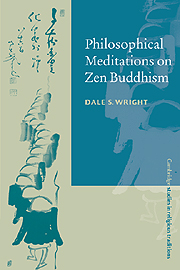ZEN MESTEREK ZEN MASTERS
« Zen főoldal
« vissza a Terebess Online nyitólapjára

Dale S. Wright
Dale Stuart Wright is the David B. and Mary H. Gamble Distinguished Professor of Religious Studies and Professor of Asian Studies at Occidental College in Los Angeles where he has taught for 37 years. He is author of books in the field of Buddhist Studies including Philosophical Meditations on Zen Buddhism (Cambridge University Press, 1998), The Six Perfections: Buddhism and the Cultivation of Character (Oxford University Press, 2009), What Is Buddhist Enlightenment? (Oxford University Press, 2016), co-editor of a series of Oxford University Press books on Zen Buddhism as well as author of numerous essays, articles, and reviews.
https://scholar.google.com/citations?user=EjWH7CsAAAAJ&hl=en
PDF: Doctrine and the Concept of Truth in Dōgen's Shōbōgenzō
Dale S Wright
Journal of the American Academy of Religion, Vol 54, No. 2 (Summer 1986) pp 257-277
Rethinking transcendence: The role of language in Zen experience
Dale S Wright
Philosophy East and West, January 1992, 42 (1), 113-138
http://www.thezensite.com/ZenEssays/Philosophical/Rethinking_Transcendence.htm
Satori and the Moral Dimension of Enlightenment
Dale S. Wright
Journal of Buddhist Ethics 13, 2006
https://www.thezensite.com/ZenEssays/Philosophical/Satori_and_Moral_Dimension.pdf
Metaphor and theory of cultural change: in search of skillful means for understanding Kamakura Buddhism
by Dale S. Wright
Payne, Richard Karl; Leighton, Taigen Dan, eds. (2006). Discourse and Ideology in Medieval Japanese Buddhism. Routledge Critical Studies in Buddhism. London; New York: Routledge, pp. 20-30.
Silence and Eloquence: How Dogen’s Dharma Match With Vimalakırti Might Have Turned Out
by Dale S. Wright
in: On-cho Ng and Charles Prebish, eds. The Theory and Practice of Zen Buddhism: A Festschrift in Honor of Steven Heine, Springer. pp. pp. 91-102.

Philosophical Meditaions on Zen Buddhism
Cambridge University Press, 1998
Contents:
Textuality: the dependent origination of Huang Po 1
Reading: the practice of insight 20
Understanding: the context of enlightenment 41
Language: the sphere of immediacy 63
Rhetoric: the instrument of mediation 82
History: the genealogy of mind 104
Freedom: the practice of constraint 119
Transcendence: going beyond Huang Po 139
Mind: the "Great Matter" of Zen 157
Enlightenment: the awakening of mind 181
Conclusion: Zen in theory and practice 207
Bibliography 217
Index 225Review: PDF: The Chan Mind: Transmission or mission-of-translation? Reading Wright’s Philosophical Meditations by Ellen Zhang
PDF: The Six Perfections: Buddhism and the Cultivation of Character
Oxford University Press, 2009
PDF: What Is Buddhist Enlightenment?
Oxford University Press, 2016
https://newbooksnetwork.com/dale-s-wright-what-is-buddhist-enlightenment-oxford-up-2016/
https://www.youtube.com/watch?v=bGuT6jA9IwIWhat kind of person should I strive to be? What ideals should I pursue in my life? These basic human questions and others like them are components of the overall question that guides this book: What is enlightenment? As Dale Wright argues, any serious practitioner of human life, religious or not, confronts the challenge of living an authentic life, of overcoming common human disabilities like greed, hatred, and delusion that give rise to excessive suffering. Why then, Wright asks, is this essential question often avoided, even discouraged among Buddhists? One reason frequently cited by Buddhists is that pondering a distant goal might be a waste of energy that would be better applied to practice: Quiet the flow of obsessive thinking, put yourself in a mindful state of presence, and let enlightenment take care of itself. In this book, however, Wright contends that pondering this question is meditative practice--that attentive inquiry of this kind is essential as the starting point and guide for any mindful practice of life. Meditative reflection on the meaning of enlightenment focuses us on our aim and direction in life. It guides us in shaping our practices, our ideals, and the kinds of lives we will live. Asking what enlightenment is as a basic form of meditation helps to activate our lives and get transformative practice underway. From Wright's perspective, there is no more important question to ask than this one. What is Buddhist Enlightenment? offers a wide-ranging exploration of issues that have a bearing on the contemporary meaning of enlightenment, including a concluding section with 10 theses that answer the title's question. Written by a leading scholar of Buddhism, the book balances deep learning and an accessible style, offering valuable insights for students, scholars, and practitioners alike. While he takes an examination of what enlightenment has been in past Buddhist traditions as his point of departure, Wright's historical considerations yield to the question that our lives press upon us--what kinds of lives should we aspire to live here, now, and into the future?
PDF: Living Skillfully: Buddhist Philosophy of Life from the Vimalakīrti Sūtra
New York : Oxford University Press, 2021.